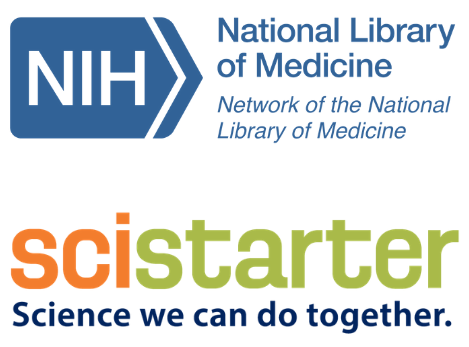 With support from the National Library of Medicine, SciStarter, a popular citizen science platform, assembled a team with expertise in instructional design, education, libraries, inclusive practices, digital design, micro accreditation, and, of course, citizen science to produce a free series of self-guided tutorials, trainings, and accompanying modules to help people from all walks of life discover and engage in authentic science.
With support from the National Library of Medicine, SciStarter, a popular citizen science platform, assembled a team with expertise in instructional design, education, libraries, inclusive practices, digital design, micro accreditation, and, of course, citizen science to produce a free series of self-guided tutorials, trainings, and accompanying modules to help people from all walks of life discover and engage in authentic science.
The two-part training and supplemental resources are designed to help facilitators, including librarians, library staff, educators, and other community conduits, learn about and introduce citizen and community science to their audiences.
Citizen science is:
- A way for anyone, anywhere to engage in science, from monitoring water quality, tracking wildlife and insect species, analyzing and classifying images of galaxies and so much more.
- A growing trend for fun, scientific engagement that libraries and community organizations won’t want to miss.
- Accessible to people regardless of background, interests, skills or location.
- A perfect addition to existing library programs, community-based organization activities, event calendars, inclusive options for seniors/adults/teens/families and more.
- Free and easily accessible through SciStarter.org, featuring thousands of
searchable projects. - An opportunity for collaborations between libraries and community organizations to leverage resources and increase engagement in authentic scientific research.
- And a way to help people address local concerns that can inform decision-making and improve related policies.
Libraries are quickly becoming hubs for citizen and community science. Many libraries are already involved in citizen science programming. Bravo! For countless others, citizen and community science is still a bit of a mystery. SciStarter and other partners have created many free resources to help libraries navigate the rapidly changing landscape, access materials, learn about projects and programs and explore a myriad of opportunities to support plans to bring citizen science to the library … including the new two-part training!
Part One: Foundations of Citizen Science
 Part one of the tutorial can be found on SciStarter.org/training. The Foundations of Citizen Science module will help anyone and everyone learn the basics, participate in projects, and make the most of SciStarter.
Part one of the tutorial can be found on SciStarter.org/training. The Foundations of Citizen Science module will help anyone and everyone learn the basics, participate in projects, and make the most of SciStarter.
Online Training: Libraries as Community Hubs for Citizen Science

Part Two: Once librarians and library staff complete the Foundations of Citizen Science module and earn the badge, they are eligible to proceed to the second hour of the training, the “Libraries as Community Hubs for Citizen Science” self-guided training module and badge, which can be found on SciStarter.org/library-training.
For a limited time, the Medical Library Association will provide professional development credits upon completion of this training.
Completion of this multimedia module takes approximately one hour.
Libraries as Community Hubs for Citizen Science meets the following objectives:
- Recognize why engaging the public in citizen science is a critical component of library life-long learning efforts.
- Identify the benefits of turning your library into a community hub for citizen science.
- Identify strategies and tools for selecting and aligning the right citizen science programs with the interests or concerns of your community.
- Identify resources (including health and medical resources) that will help you introduce, supplement, support, and facilitate awareness of and engagement in citizen science at your library.
- Identify resources and strategies that will help you train staff to recruit and sustain patron engagement in citizen science.
About SciStarter
SciStarter.org is the place to find, join, and contribute to science by providing people access to more than 3,000 searchable formal and informal citizen science research projects, events, and tools. The SciStarter website also offers a dashboard or coordinated place for members to track and earn credit for contributions across citizen science projects and platforms. More than 100,000 global citizen scientists are registered members of the SciStarter community. The SciStarter team includes educators, faculty, librarians, programmers, instructional designers, communicators, and scientists, all focused on improving the citizen science experience for everyone.
This project is funded by the National Library of Medicine, National Institutes of Health, Department of Health and Human Services, under Cooperative Agreement number UG4LM012344 with the University of Utah, Spencer S. Eccles Health Sciences Library.

This work is licensed under a Creative Commons Attribution-ShareAlike 4.0 International License.

